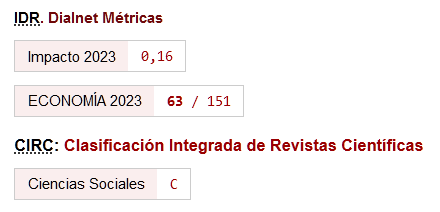Estacionalidad en el consumo de combustible: un estudio de caso de una gasolinera
DOI:
https://doi.org/10.46661/revmetodoscuanteconempresa.4350Palabras clave:
diesel, combustible, gasolina, estacionalidadResumen
El petróleo y sus derivados son bienes muy importantes en el mundo, no solo por su enorme uso sino también por las consecuencias de ese uso. La literatura tiene muchos trabajos con análisis económicos del uso del aceite. Teniendo disponible una gran cantidad de datos, proponemos un enfoque innovador: a partir de la información diaria de las ventas en una gasolinera desde 2001 a 2018, hacemos un análisis de estacionalidad de esas ventas. En un análisis separado, utilizando información de los dos turnos existentes, del día de la semana y del mes, concluimos que la estacionalidad en las ventas es significativa. Ésta es una información importante para los gerentes de la empresa, que podrían utilizar esta información para definir mejor sus estrategias.
Descargas
Citas
Backus, D., & Crucini, M. (2000). Oil Prices and the terms of trade. Journal of International Economics, 50(1), 185-213. https://doi.org/10.1016/S0022-1996(98)00064-6.
Bacon, R. (1986). UK gasoline prices: How fast are changes in crude prices transmited to the pump? Oxford Institute for Energy Studies EE2.
Bacon, R. (1991). Rockets and Feathers: The asymmetric speed of adjustment of UK retail gasoline prices to cost changes. Energy Economics, 13, 211-218. https://doi.org/10.1016/0140-9883(91)90022-R.
Borenstein, S., Cameron, A., & Gilbert, R. (1997). Do gasoline prices respond asymmetrically to crude oil price changes? The Quarterly Journal of Economics, 112, 305-339. https://doi.org/10.1162/003355397555118.
Dahl, C. (2012). Measuring global gasoline and diesel price and income elasticities. Energy Policy, 41, 2-13. https://doi.org/10.1016/j.enpol.2010.11.055.
Dickey, D., & Fuller, W. (1979). Distribution of the estimators for autoregressive time series with a unit root. Journal of the American Statistical Association, 74, 427-431. https://doi.org/10.2307/2286348.
Ferderer, J. (1996). Oil price volatility and the macroeconomy. Journal of Macroeconomics, 18(1), 1-26. https://doi.org/10.1016/S0164-0704(9. 6)80001-2.
Grasso, M., & Manera, M. (2007). Asymmetric error correction models for the oil–gasoline price relationship. Energy Policy, 35(1), 156-177. https://doi.org/10.1016/j.enpol.2005.10.016.
Hössinger, R., Link, C., Sonntag, A., & Stark, J. (2017). Estimating the price elasticity of fuel demand with stated preferences derived from a situational approach. Transportation Research Part A: Policy and Practice, 103, 154-171. https://doi.org/10.1016/j.tra.2017.06.001.
IEA (International Energy Agency) (2017). CO2 emissions from fuel combustion: overview. International Energy Agency.
Jiménez-Rodriguez, R., & Sánchez, M. (2005). Oil price shocks and real GDP growth: empirical evidence for some OECD countries. Applied Economics, 37(2), 201-228. https://doi.org/10.1080/0003684042000281561.
Kang, W., Ratti, R., & Yoon, K. (2015). The impact of oil price shocks on the stock market return and volatility relationship. Journal of International Financial Markets, Institutions and Money, 34, 41-54. https://doi.org/10.1016/j.intfin.2014.11.002.
MacKinnon, J. (1994). Approximate asymptotic distribution functions for unit-root and cointegration tests. Journal of Business and Economic Statistics, 12, 167-176. https://doi.org/10.2307/1391481.
Narayan, P., & Gupta, R. (2015). Has oil price predicted stock returns for over a century? Energy Economics, 48, 18-23. https://doi.org/10.1016/j.eneco.2014.11.018.
Szewerniak, W., Xu, Y., & Dall’erba, S. (2019). The effects of diesel price on regional trade in the USA. Journal of Economic Geography, 19(5), 1099-1118. https://doi.org/10.1093/jeg/lby052.
Tirkaso, W., & Gren, I. (2019). National gasoline and diesel demand elasticities and regional effects of carbon taxes in Sweden. Swedish University of Agriculture Sciences Working paper 02/2019. DOI:10.13140/RG.2.2.24915.84003.
Publicado
Cómo citar
Número
Sección
Licencia

Esta obra está bajo una licencia internacional Creative Commons Atribución-CompartirIgual 4.0.
El envío de un manuscrito a la Revista supone que el trabajo no ha sido publicado anteriormente (excepto en la forma de un abstract o como parte de una tesis), que no está bajo consideración para su publicación en ninguna otra revista o editorial y que, en caso de aceptación, los autores están conforme con la transferencia automática del copyright a la Revista para su publicación y difusión. Los autores retendrán los derechos de autor para usar y compartir su artículo con un uso personal, institucional o con fines docentes; igualmente retiene los derechos de patente, de marca registrada (en caso de que sean aplicables) o derechos morales de autor (incluyendo los datos de investigación).
Los artículos publicados en la Revista están sujetos a la licencia Creative Commons CC-BY-SA de tipo Reconocimiento-CompartirIgual. Se permite el uso comercial de la obra, reconociendo su autoría, y de las posibles obras derivadas, la distribución de las cuales se debe hacer con una licencia igual a la que regula la obra original.
Hasta el volumen 21 se ha estado empleando la versión de licencia CC-BY-SA 3.0 ES y se ha comenzado a usar la versión CC-BY-SA 4.0 desde el volumen 22.











